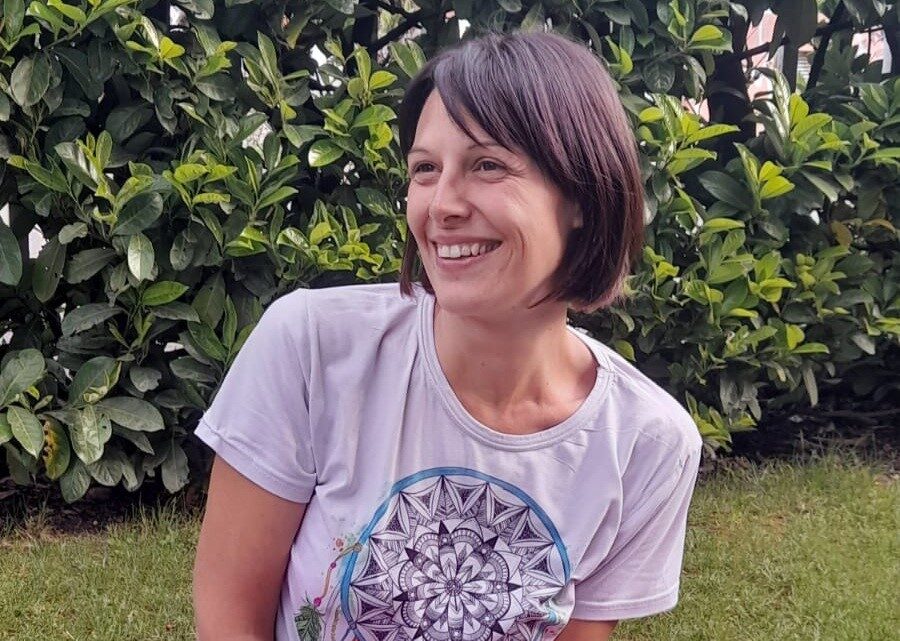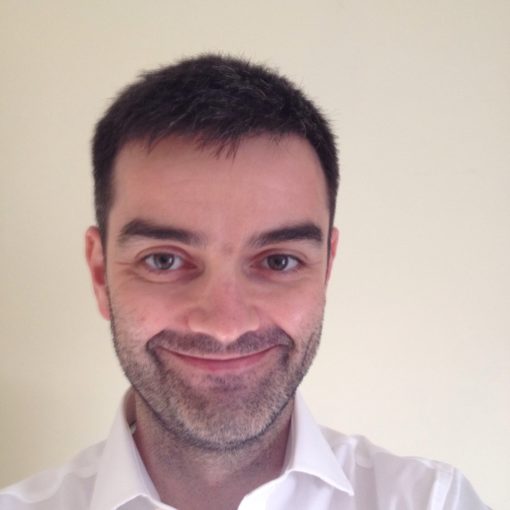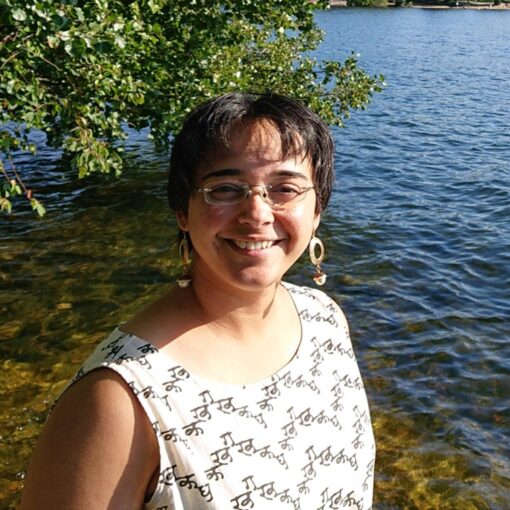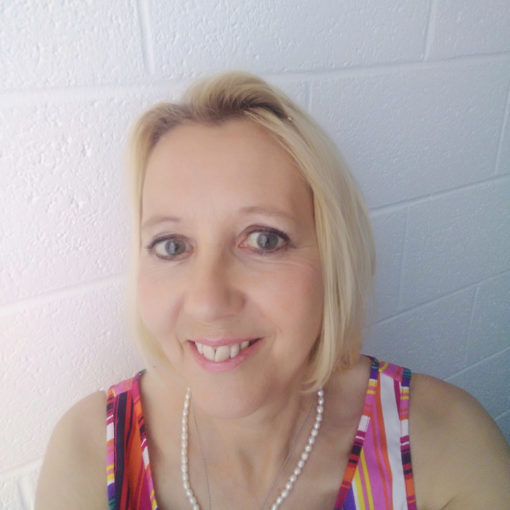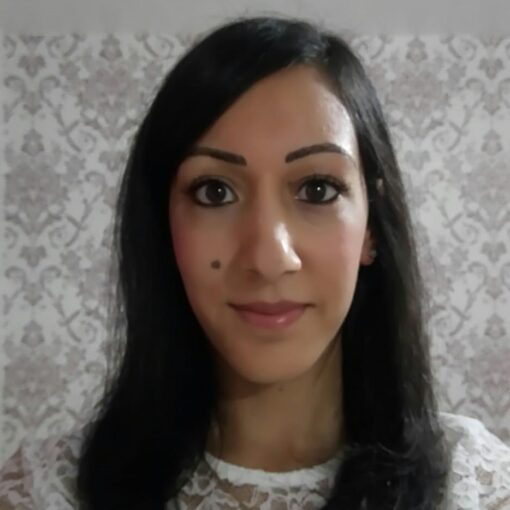PhD in molecular medicine (molecular oncology), University of Milan & SEMM (European School for Molecular Medicine) in 2012
| Science & Math teacher, Nutritionist, Science writer & illustrator, Site Coordinator for ABE (Amgen Biotech Experience) in Italy | |
|---|---|
| MIUR (Ministry of Education, University and Research) and Amgen Foundation | |
Year entered into a non-academic position: 2012
Job highlight: Finding happiness and fulfillment every day in working with many different people and showing them their potential and the beauty of science
My research training set me up to… be resilient, not to give up at the first difficulty, to stay positive, and to remain focused on my aims.
Left academia after: PhD
What is your background?
I am a biotechnologist specialized in pharmacogenomics. After my undergraduate degree in industrial biotechnology, I started to work in a big research group at the IFOM (The FIRC Institute for Molecular Oncology) in Milan studying cancer & endocytosis. I then enrolled in the PhD program at the European School for Molecular Medicine while staying at IFOM to carry out my PhD project. My research focused on a novel pathway of endocytosis of ERBB receptors, molecules belonging to a family of proteins involved in the vast majority of epithelial cancers.
After my PhD graduation in 2012, I took a position as science communication officer in the same cancer research center where I had obtained my PhD. While working as science communicator, I attended several courses organized by different institutions to develop a few more skills: scientific communication and journalism, editorial illustration, pedagogy, didactics, counseling, nutrition, health coaching and mindful eating (not all together, obviously…!).
I wanted to run my job in my own way and, finally, in 2020 I took all the courage I had and resigned from my permanent job to become a support teacher for disability (8 month contract!). But then, I was lucky again (and maybe also tenacious) and won a national call for science & math teachers by the MIUR (Ministry of Education, University and Research). Part of the application process was a very selective examination and many expert teachers didn’t pass while I did, just because I was really engaged and had studied a lot – I actually never stopped studying, even after my PhD. In September 2021, I was assigned as a secondary school teacher to a wonderful school in a small town near Milan.
Teaching is one of the most creative jobs I can imagine, the opposite of boring, not static at all and, at least for me, there is not much free time after all.
Meanwhile, I continued my job as scientific illustrator and writer, collaborating with a few publishers and with some old and new colleagues from the academic world. Once a week I also see patients for nutritional education, personalized nutritional plans and to provide guidance on eating-awareness.
Last, I collaborate with Amgen Biotech Experience (ABE), an international science education program coordinated by the EDC (Education Development Center) from Boston and supported by the AMGEN Foundation. I started this collaboration while working as science communicator, and I nurture it since I became a freelancer. Working with ABE I help high school teachers to bring biotechnology to their classrooms, provide them with professional development, curriculum materials, and research-grade equipment and supplies to perform experiments at school.
Why did you move away from academia?
Although I found the experience of being involved in scientific research exciting and amazing, during my PhD I soon realized that my favorite tasks were not at the bench: I loved preparing presentations, writing reports, drawing scientific illustrations and talking with people to help them learn about cancer and gain a healthier lifestyle.
How did your PhD prepare you for your current job? For example, what were the transferable skills that you developed during your PhD that are most relevant to your current job?
My PhD trained me to know my way around the newest pieces of research. This helped my work as a nutritionist in that I can adapt my lifestyle suggestions and nutritional plans according to the latest discoveries. Also, as a secondary school teacher I can say that my PhD is a value added: for my students, the possibility to interact with a teacher who can tell them how science works and how it develops is really stimulating and positively challenging.
Did you have any preconceptions about your sector that proved to be wrong?
Initially, I thought that teaching would represent a quite static, slightly boring, long-term job, where I could use my extensive free time to run my own business as a nutritionist and science communicator. Nothing could be more wrong… First of all, teaching is one of the most creative jobs I can imagine, the opposite of boring, not static at all and, at least for me, there is not much free time after all. I actually work a lot, almost non-stop – surely also because I do at least three jobs at the same time! But I can work in a very flexible way, find my pace and carve out time to spend with colleagues who mean a lot to me, as well as take care of my beloved children.
What are your favourite parts of your job?
The moment when I put on the music in my garden and start correcting my students’ tests, prepare my lessons and study for the coming week or design new projects for my classes. But also when I have the white paper in front of me before starting to draw a new illustration. Or when a patient sits in my study in front of me, looking into my eyes and feeling the good ‘vibe’ between us coming from trust, empathy and acceptance. Likewise, when I’m talking to my students and they ask me so many questions that there are too many to answer them all, just because the students are really interested in what I’m telling them.
For sure I’m very lucky…I have so many favourite parts of my job!
Do you have any advice for current graduate students and postdocs considering a career outside of academia?
When I started to think about leaving academia, I talked about it with some senior researchers and principal investigators and I always felt like a loser. I could read a value judgment against me in their eyes that sounded like this: “If you want to abandon the bench, it is because you’re not strong enough, you’re not motivated enough or you don’t have the guts for this”. Now I know that this was just their way of seeing professional life, probably because they found their fulfillment in academia. But this was their story, not mine!
So, I want to tell you that if you’re considering a career outside academia, you’re not a loser, you’re just wise enough to take into account all the potential that you have in order to choose what fits best with you.
Every experience, every course, every challenge, all contribute to what we are and we would not be the same without that experience.
When I was searching for my path, I often had the sensation that I was losing time and that, despite all my efforts, I was always stuck at the same point. Today I can say that this is not true: every experience, every course, every challenge, all contribute to what we are and we would not be the same without that experience. When we plant some seeds they will not always give rise to a plant, but we need to keep doing it. Like Albert Einstein said “Keep on sowing your seed, for you never know which will grow – perhaps it all will”.
You’re doing something really special and incredibly important: you’re discovering your original professional path! So, be brave and good luck!
Companies & Websites:
I work for the MIUR (Ministry of Education, University and Research) as a teacher, am self-employed as a nutritionist and science writer & illustrator, and work for the Amgen Foundation as a site coordinator.
Ministry of Education, University and Research: https://www.miur.gov.it
Amgen Biotech Experience: https://amgenbiotechexperience.net/it/eng

